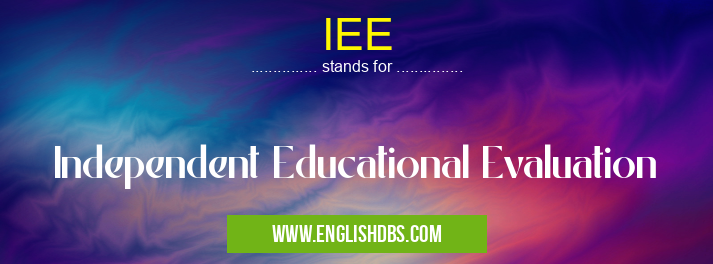What does IEE mean in EDUCATIONAL
An Independent Educational Evaluation (IEE) is an assessment conducted by a qualified examiner who is not employed by the student's educational institution or related to the assessing team. It is requested to gain an independent review of an individual's educational abilities and progress which can be used for a variety of reasons, including to determine eligibility for special educational services or interventions.

IEE meaning in Educational in Community
IEE mostly used in an acronym Educational in Category Community that means Independent Educational Evaluation
Shorthand: IEE,
Full Form: Independent Educational Evaluation
For more information of "Independent Educational Evaluation", see the section below.
» Community » Educational
Benefits
An Independent Educational Evaluation provides families, schools and other stakeholders with additional insight into a student's academic abilities and learning needs. This unbiased assessment can give educational providers a more holistic view than what can possibly be obtained from classroom curriculums or standardized testing results alone. Moreover, parents may choose an Independent Educational Evaluation for their own peace of mind if they are dissatisfied with their child's performance in the public school setting.
Process
The process of requesting and conducting an IEE involves several steps. First, the evaluator must be approved by the local education authority then paperwork must be filed requesting the assessment. The examiner must have relevant experience in evaluating students with potential disabilities as well as knowledge regarding applicable state laws regarding assessments. A meeting is often held between all involved parties before beginning to discuss what type of information will be collected during the evaluation period and whether any additional services may be needed in order to provide comprehensive assessment results. Afterwards, the evaluator will conduct assessments on the student such as completing questionnaires, examining records and scoring tests. Afterwards, they prepare comprehensive findings and make recommendations based on their evaluation results that can help inform decision making going forward.
Essential Questions and Answers on Independent Educational Evaluation in "COMMUNITY»EDUCATIONAL"
What is an Independent Educational Evaluation (IEE)?
An Independent Educational Evaluation (IEE) is an assessment by a qualified professional, such as a psychologist or educational diagnostician, that provides an objective determination of a child's strengths and needs related to their educational progress. The evaluation may consider assessments in areas such as academic achievement, intellectual functioning, adaptive behavior, social/emotional functions, language development, and other skills necessary for successful academic performance.
Why might I need an IEE?
Parents or legal guardians often request an IEE for various reasons. They may want to understand the student's learning profile in more detail or gain clarification on strengths and weaknesses compared to other students of the same age group. It can also help identify appropriate strategies and interventions for helping the student succeed in the classroom.
Who pays for an IEE?
Generally, if parents or guardians are requesting an IEE because their child has been recommended for Special Education services, then the school district is responsible for paying for it. If not recommended by the school system but requested by parents or guardians independently, then they will be responsible for covering costs associated with it.
When might I ask my school district to pay for an IEE?
If you feel your child needs additional testing that is not offered by the school system and would benefit from getting further input from a qualified professional, then you may be able to request that your school district pay for it. This decision will likely depend on individual circumstances so it's best to check with your school system before pursuing outside intervention.
How do I find qualified personnel to conduct an IEE?
Start by researching professionals who are certified and have experience conducting Independent Educational Evaluations in your area. Make sure they are licensed in accordance with state regulations, provide references if available, and have prior experience working with similar cases/populations of individuals.
What information should be included in an IEE?
Each assessment should include a comprehensive evaluation protocol specific to the individual student's educational needs along with detailed reports evaluating cognitive abilities, academic achievement levels and any related special needs if applicable. This should also include relevant recommendations and strategies based on those results which can help inform instruction within the classroom setting and at home activities.
Is there any federal law that requires public schools to pay for IEES?
Yes; under IDEA (Individuals with Disabilities Education Act), when parents dispute findings made by a public education agency about their child's eligibility for special education services — or disagree about a proposed Individualized Education Plan — they are entitled to an independent evaluation paid by the public agency at no cost to them.
Are all IEES considered valid evidence?
No; while independent evaluations provide important insight into students' progress and can serve as valuable evidence during decision-making processes related to eligibility determinations or placement options — schools must still ensure that test results meet accepted scientific principles and guidelines before considering them valid evidence.
Final Words:
Ultimately, Independent Educational Evaluations can provide invaluable insight into a student's abilities when formal assessments conducted by schools do not adequately meet their needs or provide sufficient information about their strengths and weaknesses. They are used not only to diagnose learning disabilities but also to inform decisions related to course placement, special education programs, accommodations or other modifications necessary in order for students to reach their full potential.
IEE also stands for: |
|
| All stands for IEE |
